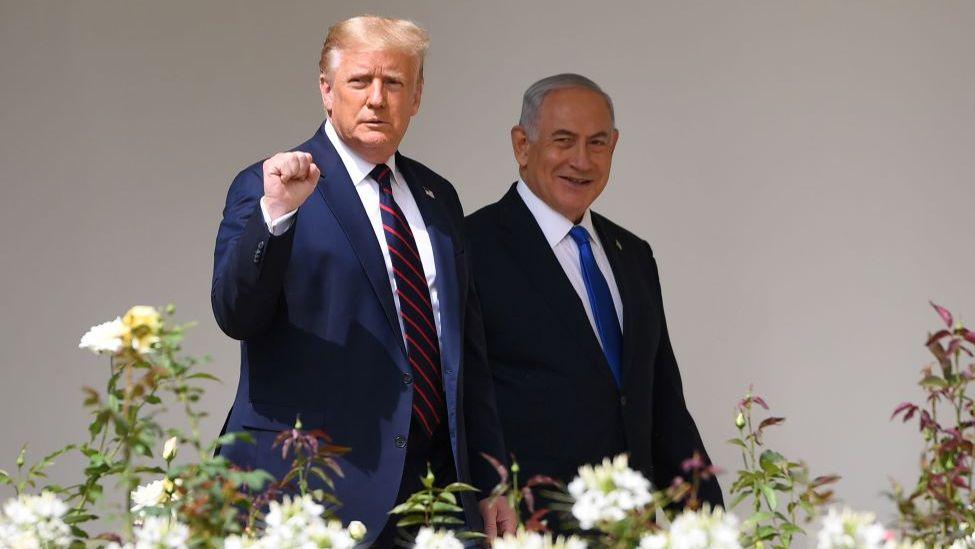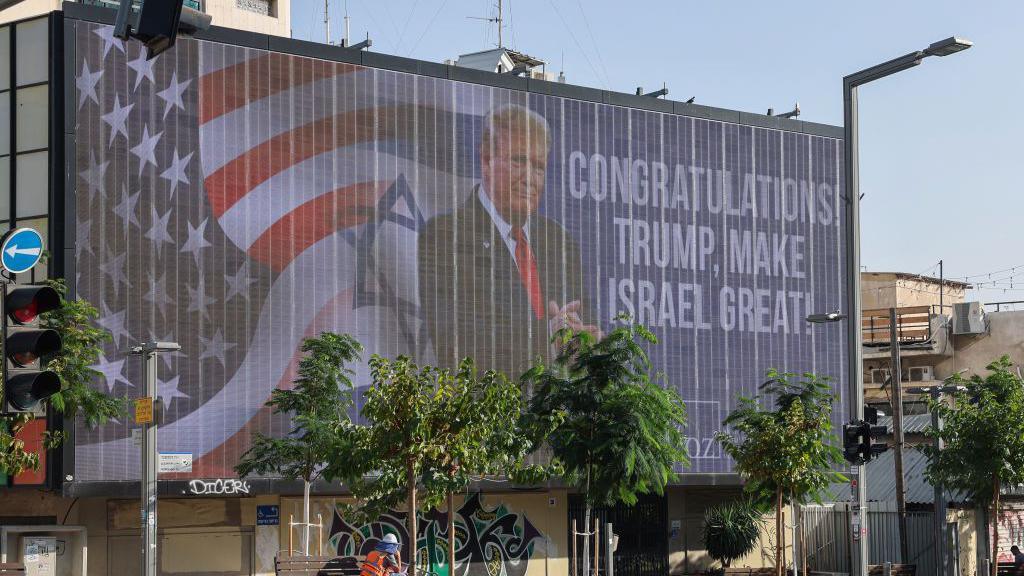No guarantees Trump will give Netanyahu all he wants

- Published
The bar facing the US embassy building in central Jerusalem is called Deja Bu - a witty reference to something you’ve drunk before.
And outside the gates of the US compound, Israel is eager for a second round of Donald Trump.
"I'm very pleased," said Rafael Shore, a rabbi who lives in Jerusalem's Old City. "He understands the language of the Middle East.
"Iran will think twice about doing anything. I think if Kamala had been elected, there wouldn't be much fear in the Middle East of attacking America or Israel."
Israel's Prime Minister, Benjamin Netanyahu, was one of the first to congratulate the new president-elect on Wednesday morning. "Congratulations on history's greatest comeback!" he tweeted.
Netanyahu has previously called Trump the "best friend Israel has ever had in the White House".

Rabbi Rafael Shore is one of many Israelis who welcomes Trump's victory in the US elections
Trump previously won favour here by scrapping an Iran nuclear deal that Israel opposed, brokering historic normalisation agreements with several Arab countries and upending decades of US policy - and international consensus - by recognising Jerusalem as Israel's capital.
Donald Trump's first term in office was "exemplary" as far as Israel is concerned, said Michael Oren, a former Israeli ambassador to the US.
"The hope is that he'll revisit that. [But] we have to be very clear-sighted about who Donald Trump is and what he stands for."
Firstly, he said, the former president "doesn't like wars", seeing them as expensive. Trump has urged Israel to finish the war in Gaza quickly.
He's also "not a big fan" of Israel's settlements in the occupied West Bank, said Amb Oren, and has opposed the wishes of some Israeli leaders to annex parts of it.
Both those policies could put him in conflict with far-right parties in Netanyahu's current governing coalition, who have threatened to bring down the government if the prime minister pursues policies they reject.
When called upon to choose between the recent demands of his US ally and the demands of his coalition partners, Benjamin Netanyahu has tended to choose his coalition.
Friction with the current US President, Joe Biden, has grown sharply as a result.
Michael Oren believes Netanyahu will need to take a different approach with the incoming president.
"If Donald Trump comes into office in January and says, 'OK, you have a week to finish this war,' Netanyahu is going to have to respect that."
In Gaza, where the Israeli military has been battling Palestinian group Hamas, desperation has narrowed the focus of some residents to that single goal.
Trump "has some strong promises", Ahmed said. "We hope he can help and bring peace."
Ahmed's wife and son were both killed in the war and his house destroyed.
"Enough is enough, we are tired," he said. "We hope Trump is strong so that he can resolve this issue with Israel."

A billboard in Tel Aviv congratulating Trump
Mohammed Dawoud, displaced eight times during the Gaza conflict, said a Trump victory meant that the end of the war would come soon.
Another displaced resident, Mamdouh, said he didn't care who won - he just wanted someone to help.
"There’s no medicine, no hospitals, no food. There’s nothing left in Gaza," he said. "We want someone strong who can separate us and the Jews."
In the occupied West Bank, home of the Palestinian Authority (PA), there is widespread scepticism about American influence, with many viewing US administrations from both sides of the political aisle as siding with Israel.
"Mediocre solutions which come at the expense of the Palestinians, or endless military support for Israel, is going to be nothing but a catalyst for future confrontations," said Sabri Saidam, a senior member of the PA's main faction, Fatah.
"We would like to see a new version of Trump, more like a Trump 2.0 who's serious about immediately ending the war, and addressing the root cause of conflict in the Middle East."
Recent polls suggested that more than two-thirds of Israelis wanted to see Trump back in the White House. But here too, there are those who caution about his unpredictability and his approach.


"He's going to make the situation here more uncertain and unsafe," one Israeli woman said. "I don't trust him to keep the peace. I honestly think he'll just make the war worse."
The former Israeli ambassador, Michael Oren, said he believed there were "tremendous achievements ahead" if Israel co-operated with Trump, including the potential for a historic peace deal with Saudi Arabia and checks on Iran's influence.
But it could also be harder for Netanyahu to navigate the demands and compromises involved in those regional goals.
Since Trump's last term in office, moderate voices around both leaders have dwindled.
Many in Israel view Trump's first term with fond memories. But relationships can be radically different the second time around - and past performance is no guarantee of future returns.